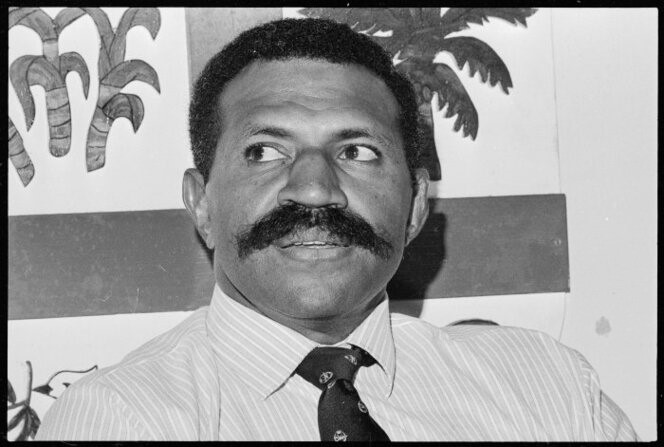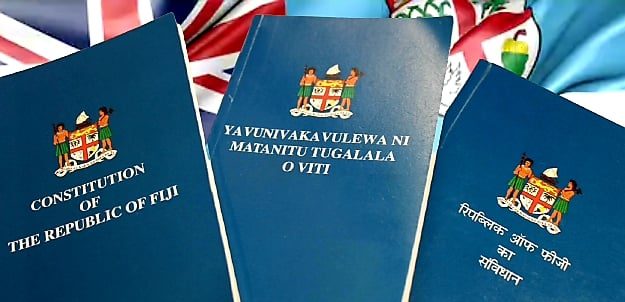This year marks the 34th anniversary of Fiji’s first military coup on 14 May 1987 – an event that changed the country’s destiny.
The coup, instigated by third-ranked military officer Lieutenant-Colonel Sitiveni Rabuka, stunned the country, but given our troubled background, we should perhaps have been more prepared.
The 1987 coup is blamed for Fiji’s “coup culture”, with subsequent upheavals in September 1987, May 2000 and December 2006. However, the roots of the problem lie not in 1987, but in another era. Not that this absolves the coup instigators – sedition is a crime – but the 1987 coup, as has been argued by others, was a product of colonialism.
When the British shipped (on the basis of false promises) around 60,000 Indian indentured labourers to Fiji between 1879 and 1916, they did not bother to consult the indigenous Fijians, such was their sense of entitlement.
Colonial avarice has had a lasting effect, with indigenous Fijians and Indo-Fijians ending up in a situation not of their making, but which they need to fix. Colonialism cannot become an endless excuse, especially 50-plus years after independence. Besides, the lust for political power and privileges by the elites also feed into our coup culture.
For the Indian arrivals, Fiji turned out not to be an entirely poor decision. After the harrowing journey, and at the conclusion of servitude in the country’s cane fields, many chose to stay back as their prospects in India did not look that bright.
In typical migrant fashion, generations of Indo-Fijians worked hard to survive since, unlike the indigenous Fijians, they had no land or communal network to fall back on. Indo-Fijians prioritised education, and fought for equal citizenry in a country that has not only been accommodating, but has given them much in return, although too many still live in poverty.
Indigenous Fijians were hampered by traditional obligations, and frustrated by the yoke of colonialism, including an edict restricting them to village boundaries. This prevented the more enterprising indigenous Fijians from establishing themselves commercially in the towns and cities, giving the Indo-Fijians a head start. In subsequent decades indigenous Fijians have become better represented in the professions, and have developed a strong middle class, making inroads in business, especially in the tourism sector.
In the 1980s, however, indigenous fears about economic marginalisation and political displacement gained momentum, with some leaders using the race card to fuel anxieties. The catalyst for the 1987 coup was the electoral loss of the indigenous Fijian-dominated Alliance Party to the National Federation Party-Fiji Labour Party coalition.
Adding salt to the Indo-Fijian wound was the coup date’s link to the arrival of the first Indians to Fiji’s shores on 14 May 1879. In addition, many cannot forgive the appalling treatment of Fiji’s second prime minister, the distinguished Dr Timoci Bavadra, who lasted only a month in power. The late Bavadra was labelled an “Indian stooge” for promoting multiracialism.
Some claim the 1987 coup divided the country, but in reality, the country was already divided. The coup aggravated existing divisions and brought them to a head. Some saw the coup as a means of catharsis – an opportunity for Fiji to come to terms with its problems and find solutions. In reality, it has been more like a cancer that has spread, and continues to plague the country.
The 1987 coup was an undeniably traumatic event, with prolonged social and economic consequences. At the same time, those who have stayed behind – and many Indo-Fijians have of course left – have had no choice but to pick up the pieces and trudge on, hopefully having learnt from history and personal experience of the devastating impact of coups. Perhaps in time, Fiji will indeed become a Singapore or a Mauritius, as envisioned by some. This process of maturation not only takes time, it comes with trials and tribulations since humanity is complex, and even more so given the volatile mixture that makes up humanity in Fiji.
There is hope: even Rabuka changed to team up with his nemesis, the National Federation Party leader, Jai Ram Reddy, to implement a more equitable Constitution, only to be rejected by voters in the 1999 elections. Rabuka lost the prime ministership but says it was worth the 1997 Constitution.
Leaders play a crucial role, and Fiji will only progress if there are no more coups. But the population also has to learn from the past. In a mixed society, everyone has a stake in social cohesion and has to make it work if the country is to progress.
An earlier version of this article was published by the Fiji Times.





Thanks for the response. Please provide some links to the Dr. Brij Lal’s dismissal of the theory in U.S or foreign involvement in 1987 coup.
Rabuka has sung like a canary on some things but cagey on other relevant details. However some if Rabuka’s invitation to the U.S. Congress Prayer breakfast and White House visit [ https://www.fijileaks.com/uploads/1/3/7/5/13759434/published/rabuka-white-house-meeting.jpg?1485734866%5D , coupled with his statements that the 1987 coup was “God’s Plan ” does raise eye brows.
A thought-provoking article that rises above the finger-pointing and blame game that we often hear, to give clearer and deeper insights into the issues at stake and the direction Fiji needs to move to become a better country. For the younger generation like us, who were not around during the 1987 coup, such a short article provides such deep understandings.
I am a graduate student at Fresno State, California, researching girmit and girmityas for my graduate thesis. Dr. Singh’s article and a few conversations with scholars on girmit and indentured labor, in general, have been real eye-openers for me. My first takeaway is that periodizing my research between 1879 and 1920 alone might be an inadequate framework. I cannot stop at 1920 and I have to look at the history of girmit and Fiji in a continuum.
Thank you so much Dr. Singh for this great insight.
One of the best analyses I have read of the causes, historical context and contemporary legacy of Fiji’s 1987 military coups.
There is another perspective to the 1987 coup that is seldom covered in the main stream media nor by their journalists.
This view was published in “Covert Action Information Bulletin” Issue No. 29 published in Winter of 1988.
Link [ https://archive.org/details/CovertActionInformationBulletin29%5D
“I am positive that these Fijian soldiers, these so-called
Fijian soldiers, who invaded our parliament were in fact U.S.
marines.”1
This startling claim comes from Noor Dean, Deputy
Speaker of the now deposed Bavadra government. A third
generation Indo-Fijian, Noor Dean graduated from Grays
Inn, London, as a barrister in 1980.
He was serving his first
term as a member of the Fijian parliament as part of the
Labour Party coalition government when the political stability
of Fiji was shattered on May 14, 1987 by Lt. Col. Sitiveni
Rabuka’s military coup.
Other allegations have arisen regarding the U.S. role in the
coup.
A visit by ex-CIA deputy director, now U.S. Ambas-
sador to the United Nations, Vernon Walters 12 days before
the coup; a mysterious U.S. C-130 transport plane flight into
Fiji two days prior to the coup; and links between a U.S. Agen-
cy for International Development (AID) official and far right
Fijian politicians have all raised questions about the possible
role of the U.S. government in the overthrow of the progres-
sive Bavadra government.
Reason to Intervene.
Fiji was a founder in the nuclear-free South Pacific move-
ment, demanding an end to port -calls by all ships that were
nuclear-powered or carried nuclear weapons. The U.S.
government saw this position as a fundamental threat to its
naval control of the Pacific. Not surprisingly, the over-thrown
labour government of Timoci Bavadra was fully behind the
nuclear ban.
•Max Watts is a journalist for various European and Australian
newspapers and radio stations. Mark James is a reporter for Sydney Educational Radio (2SER), a respccted independent station.
1. A similar claim comes from Rosemary Gillespie., a Melbourne,
Australia law student who had previously worked for the conservative Mara
government, but who had revealed U.S. CIA involvement in the 1982 elections. She was arrested by a he military during a visit to Fiji on August 15, 1987.
Gillespie had been gathering evidence conceming foreign involvement in the coup and had found a witness who was in parliament at the time of the coup.
The witness said, “I looked into the eyes of one of the soldien: (during the coup) it was not a Fijian. He was wearing white gloves and a Balaclava (ski mask) and I could only see his eyes. He was a fair man. He was not a black man and he could not have born Indian.”
Gillespie was interrogated eight
times during her detention and was threatened with knifing and hanging. She was later released without charge.
2. Col. Rabuka may had military help from other friends as well.
Shortly before the coup, a secret shipment of Uzi mactine guns arrived from
Singapore, which is a center for lsraeli arms shipments. Since: New Zealand
and other nations refused to recognize the Rabuka government, Israel announced plans to open an embassy in January.
From Israeli Foreign Affairs., November 1987. Subscriptions to IFA can be obtained from: lsraeli Foreign Affairs, P.O. Box 19580, Sacramento CA. 95819.
(…)
Thank you for your response. It’s true that the mainstream media have not covered speculation about possible US involvement in Fiji’s 1987 coup.
There is much doubt about it.
An authority on Fiji and the coup, Professor Brij Lal of ANU, has all but dismissed the theory.
Rabuka has sung like a canary about the coup but little mention, if any, about the US. Not even in his book.
Cold War politics was well and alive back then, and the stakes were high for the US due to the Bavadra government’s anti-nuclear, non-alignment policy.
The US had built a reputation for helping remove and install governments.
In the Fiji case, however, there has been lots of speculation but never been any hard evidence of the US hand.
Excellent article a balanced and well thought views.